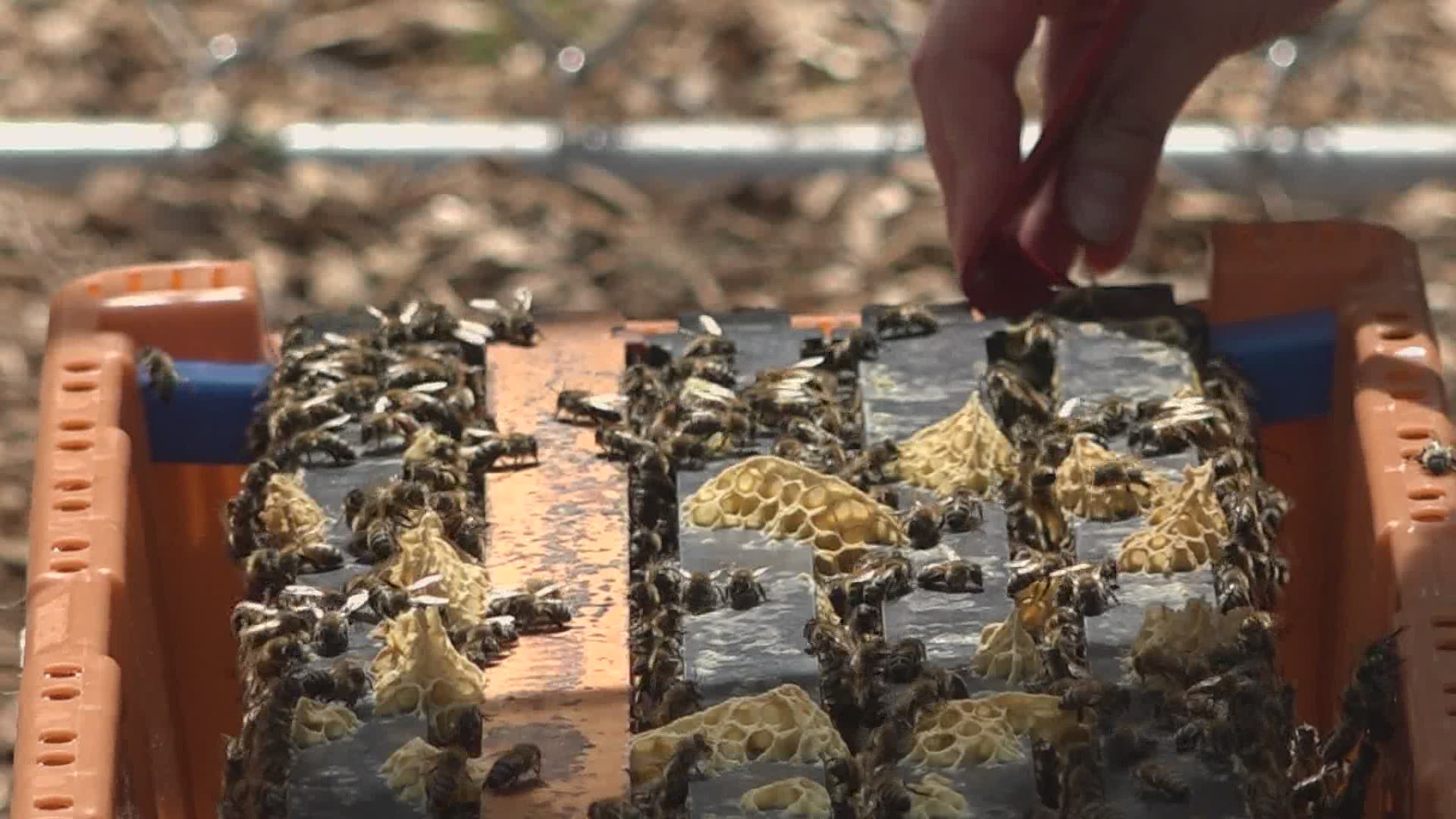GORHAM, Maine — In a quiet corner of Robie Park in Gorham last week, thousands of honeybees found a home. Before you cringe and think – ‘’Well, I’m never going there”… rest assured these honeybees have little interest in you – they are there to do what they do best – produce honey.
The folks who set them up – and who will keep tabs on these bees - are high school students– and brand new members of the Gorham High School Bee Club.
For a teacher, it’s the stuff that dreams are made of. "This was one of those divine things that teachers are always hoping for," says Catherine Paul. "When a student comes to you as a teacher and says, “I’d like to learn about – fill-in-the-blank. Can you teach it to me?”
Catherine Paul is a Gorham High School English teacher, a homesteader, and more specifically, a beekeeper. Knowing that, her students came up with an idea. “We’d like you to teach us how to be bee keepers.”
And that is exactly what she did. They took time during their pandemic remote days to meet on Zoom and learn just about everything they’d need to know to become beekeepers. And last week? Catherine and her beekeeping students set up new hive boxes, ready to meet their bees – roughly 20,000 of them. "This is the first time that they’re taking their book learning and our discussions to hands on live bees. It’s a really big deal," she says with a smile.
The bees come in boxes that are called “nukes” or nucleuses – two of them, with an estimated 10,000 bees in each box. Before entering the bee pen, the kids start up the smoker, used to calm the bees. The nukes are opened, and one by one, the frames full of live bees, eggs, and larva are lifted, gently transferred to the hive boxes, and fit in to place. The bees are really focused their queen, and beekeepers try to identify the queen during this process. And they did! "She’s painted on the back with white, she’s a little longer than the rest of them," says student Michelle Darling. "I really enjoyed the process of it, like picking it up, and doing it and then thinking about what to do next - once you picked it up and looked at it all the anxiety kinda went away and you’re like this is nice, this is awesome...!"
Catherine puts it like this. "You can think about it, you can read about it, you can watch videos about it, but then to actually have 20,000 bees swarming around you, you really have to have composure."
Dylan Phillips was also one of the student beekeepers. "You know, once you got in there with them they were really, really friendly, they weren’t aggressive at all and, honestly, it’s just like - it’s really nice. It’s peaceful, honestly. You start listening to the bees and it’s a slow nice process. And it was a great day to do it."
The bees identify which hive is theirs by the smell of their queen. And they all have different jobs – there are nurse bees, and worker bees, even guard bees who stand at the entrance. "They’re one organism. Even though there’s thousands of them, they live and breathe by each other. So there’s all this wonderful metaphorical meaning behind the community of bees and the hive mind. So, I think that if you’re respectful of that? Then they accept you as being part of their community," says Catherine.
The students put sugar water feeders under the hive boxes to help the bees as they settle into their new home. They’ll check on them over the summer, and in the fall, hope to harvest some of the honey from the hive.
There was a surprising calm that swirled around this little beehive of activity. Everyone watched as the students worked almost forgetting that they were surrounded by tens of thousands of bees. Beekeepers will tell you that working with bees can be peaceful, that any anxiety you might have slips away.
Catherine sums it up this way. "I’m gonna make an English connection since I’m an English teacher. Thoreau was a beekeeper, I’ve read things about Emerson being a bee keeper, there’s this kind of um, transcendentalist philosophy behind beekeeping where you really need to be calm, and centered and a part of nature in order to be a successful bee keeper."
The hives are housed in Robie Park, which is adjacent to Gorham High School. This really was a town-wide effort. Gorham Public Works and the Rec Department built the beeyard to house the hives, and the bees came from Backwoods Bee Farm in Windham. The students will teach a beekeeping class at Gorham Rec next year – so, as a result of this project, there will be multiple generations of beekeepers in the Gorham community.

